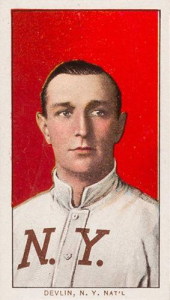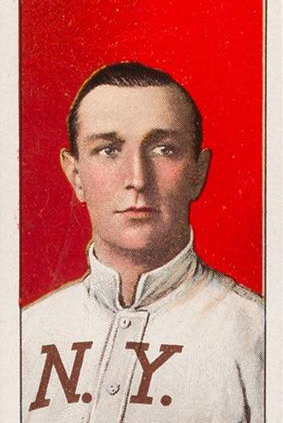Art Devlin
 The man Frank Graham called “the greatest third baseman ever to wear a Giant uniform” and Grantland Rice’s third baseman on his all-time Giants team, Art Devlin was born October 16, 1879, in Washington, D.C., one of several children of Edward Devlin, an Irish immigrant who made his living in Washington as a harness maker and locksmith.
The man Frank Graham called “the greatest third baseman ever to wear a Giant uniform” and Grantland Rice’s third baseman on his all-time Giants team, Art Devlin was born October 16, 1879, in Washington, D.C., one of several children of Edward Devlin, an Irish immigrant who made his living in Washington as a harness maker and locksmith.
Devlin grew up in Washington and entered Georgetown University on September 13, 1899. An outstanding athlete, he starred on the football and baseball teams. Starting at halfback, he was switched to fullback to make the best use of his size (six feet tall, 175 pounds) and speed. The team did well the two seasons he played, and Georgetown football historian Morris A. Bealle named Devlin the all-time Georgetown fullback. He also stood out on the baseball team, usually playing first base, getting his share of hits, and stealing bases almost at will.
In 1902 and 1903 Devlin served as head football coach at North Carolina College of Agriculture and Mechanic Arts, now known as North Carolina State. He compiled a 7-8-2 record.
Devlin does not seem to have been much of a student, leaving Georgetown in 1901 without a degree to play professional baseball. He struggled at first, but with Newark in the Eastern League in 1903, he developed into a solid ballplayer. He settled in at third base for the full season, hit .287, and stole 51 bases. More important, Giants manager John McGraw scouted Devlin, liked what he saw, and signed him.
Devlin joined the Giants in 1904 to a less than rousing welcome, with teammates and opponents often dismissing him as “McGraw’s college boy.” He made his debut in Brooklyn on April 14, going hitless but handling four chances at third in support of Christy Mathewson‘s 7-1 victory. Sporting Life noted: “Devlin played third base in place of [Roger] Bresnahan, who was injured in the game with Columbia the previous day.”
Devlin’s hitless debut belies what was the distinguishing “fact” about his career—that he hit an inside-the-park grand slam home run in his first major league at-bat. Devlin’s career day came on April 22 against Philadelphia in the Polo Grounds: four hits in five trips, four runs, four flawless chances, and the grand slam off John Brackenridge. Sporting Life solemnly declared, “The batting of Devlin was a feature, he hitting the ball for a home run with the bases full in the fourth inning.” It was his only home run of the season and one of just ten for his career.
Devlin finished his rookie year with respectable numbers on a pennant-winning team, and slipped a bit in his sophomore year, but stole a league-leading 59 bases (tying Billy Maloney of Chicago), the only time he ever led the league in an offensive category. The Giants won the World Series, defeating the Philadelphia Athletics as Mathewson and Joe McGinnity threw four shutouts between them. The Athletics scored one of their three runs in Game Two (and for the Series) in the eighth inning when Bresnahan dropped Devlin’s relay. Devlin hit .250 and drove in a run for the Series.
Devlin had his best season in 1906, on and off the field. He hit a career-high .299, drove in 65 runs, drew a personal-best 74 walks, and stole 54 bases. His efforts were in vain as many Giants fell to injuries and illness-and the Cubs won 116 games, leaving everybody in their wake.
Besides fielding everything that came his way, Devlin snagged a bride—Ilma Wilk, whom he had met during his Georgetown days and who was the daughter of Frederick L. Wilk, vice-president of the Union Trust Company of Chicago. They were married Thanksgiving Day (November 29). One paper, avoiding gushiness, announced: “RICH BRIDE FOR PLAYER.” The secondary lines specified: “Devlin, of New York Giants, to Wed Wealthy Chicago Girl.”
The 1907 season, with the Cubs winning the pennant again and the Giants dropping into fourth place, was a prelude to 1908, the season of infamy to all Giant fans. Devlin fell off at the plate, but he showed off his glove work. On May 23, he tied a record by handling 13 chances at third; unfortunately, he made two errors, and the Cardinals won, 6-2. The errors and the loss were bad enough, given the outcome of the season, but Devlin made one off the field, too. With the Giants seemingly in first place for good, Harry Niemeyer of the New York Globe reported from Pittsburgh on August 26 that the players were spending money before getting it. Playing along, Devlin promised his wife a Persian lamb coat.
Devlin played solid ball in 1909 and 1910 but began to decline in 1911. He played every infield position, but his legs were bothering him, McGraw replaced him at third with Buck Herzog, and he got into only 95 games. Although the Giants won the pennant, he didn’t play in the Series.
An incident during the game against Brooklyn on June 23, 1910, suggests that Devlin didn’t study diplomacy at Georgetown. The Giants were winning at Washington Park when a fan, according to Sporting Life of June 30, hollered, “‘Devlin, you dog, will you never stop?’” A nearby youngster translated the epithet as “Yellow Dog,” bringing Devlin into the stands. Larry Doyle and Josh Devore followed to help. Everybody got into it, including McGraw, before Bill Klem “butted in as a peacemaker.” All three players were thrown out of the game. Devlin was arrested and released, but arraigned the next day as one Bernard J. Rossier Jr. charged him with assault and planned to sue him for $5,000 in damages. League president Thomas Lynch suspended Devlin and fined Doyle and Devore $50 each for being accessories. It all blew over. A gentleman signing himself “C. Steinmann” wrote to National Commission Chairman Garry Herrmann on stationery from The Waldorf in Hamilton, Ontario, noting that “fining & suspending injured [i.e., insulted] players is not the fair method of punishment …” Further, he said, “I have seen Arthur Devlin play many games & I know he is a player who is a credit to his profession being gentlemanly & has no bad habits.”
Devlin was traded to Boston, having a decent season in 1912 and a weak finale in 1913. He did, however, go out in style and with a sense of humor, as Harold Kaese tells it in The Boston Braves (1948). On August 25, Devlin hit a single in the ninth inning to beat Pittsburgh, only to be released to Rochester that night in favor of a pitcher named George Davis. Devlin said, “‘I wonder where they would have sent me if I’d struck out—Medicine Hat?’”
Since the Giants got to the Series in 1912 and 1913, and the Braves pulled off their miracle in 1914, Devlin missed out all around.
Making matters worse, he and Ilma separated in December 1911. She moved back to Chicago, declaring the break “‘impossible to mend.’” Her father said, “‘I have heard stories that Devlin has not been doing the right thing by her.’” The Devlins divorced.
No playing record exists for Devlin in 1914 though he managed last-place Oakland in the Pacific Coast League for part of the season. He moved around the minors from 1915 to 1918, playing third and first base and managing with meager success.
His playing career over, Devlin held coaching jobs with the Giants, Braves, and Pirates from 1919 until 1935. He held a variety of jobs thereafter, including a position with the Home Owners Loan Corporation in Washington during World War Two. He was also involved in an executive capacity with a semi-professional baseball league in northern New Jersey. Toward the end, he worked in a hospital in Hudson County, along with Danny Murphy, a member of the Athletics team of 1905. His second wife, the former Gertrude Griffin, died August 16, 1948 (the same day as Babe Ruth), leaving him despondent and in ill health. Art Devlin died September 18, 1948, in Jersey City. He is buried in Congressional Cemetery in Washington, DC.
A steady but unspectacular player, Devlin hit above average, drove in and scored runs, stole bases, bunted and executed the hit-and-run to perfection, and drew some walks. He didn’t create headlines, just wins. Devlin shone brightest as a fielder and was generally considered the best third baseman of his day, a view supported by his high ranking in total chances per game. Graham and Rice knew what they were talking about.
Last updated: October 24, 2020 (ghw)
Note: A slightly different version of this biography appeared in Tom Simon, ed., Deadball Stars of the National League (Washington, D.C.: Brassey’s Inc.: 2004).
Sources
Anderson, David W. More than Merkle: A History of the Best and Most Exciting Baseball Season in Human History. Lincoln and London: University of Nebraska Press, 2000.
Art Devlin Files at the National Baseball Hall of Fame and Museum in Cooperstown, New York.
Bealle, Morris A. The Georgetown Hoyas: The Story of a Rambunctious Football Team. Washington, D.C.: Columbia Publishing Company, 1947.
Fleming, G. H. The Unforgettable Season: The Most Exciting & Calamitous Pennant Race of All Time. New York: Holt, Rinehart and Winston, 1981.
Hoie, Bob, Carlos Bauer, et al, eds. The Historical Register: The Complete Major & Minor League Record of Baseball’s Greatest Players. San Diego and San Marino: Baseball Press Books, 1998.
McConnell, Bob, and David Vincent, eds. SABR Presents the Home Run Encyclopedia: The Who, What, and Where of Every Home Run Hit Since 1876. New York: Macmillan, 1996.
Full Name
Arthur McArthur Devlin
Born
October 16, 1879 at Washington, DC (USA)
Died
September 18, 1948 at Jersey City, NJ (USA)
If you can help us improve this player’s biography, contact us.


